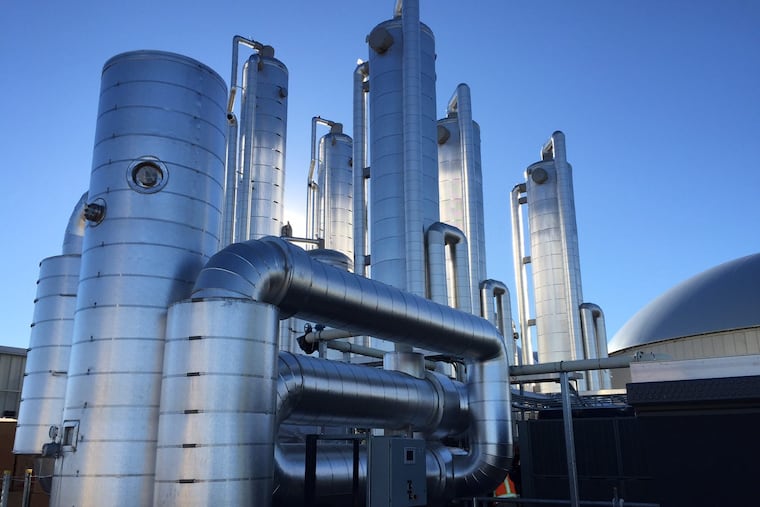Shuttered Philly refinery carves out a 23-acre parcel for a renewable gas producer
The plan to carve the vacant land, located on Maiden Lane to the west of the Schuylkill Expressway, indicates that RNG intends to move ahead with its plans to build a plant that can convert food waste into methane gas.

Philadelphia Energy Solutions on Monday received city zoning approval to carve out a 23-acre parcel from the bankrupt refinery complex to accommodate a renewable gas plant, setting the stage for a reuse of part of the property that is now undergoing a court-supervised sale.
RNG Energy Solutions LLC, which entered into a long-term lease with the refinery in 2018 to build a $120 million digester that can convert food waste into methane gas, drafted the subdivision plans, according to a filing with the Philadelphia Department of Licenses and Inspections. RNG’s joint venture with the refinery predates the June fire and explosion, which caused the refinery to close and declare bankruptcy.
RNG in August entered into a “mutual cooperation agreement” with Philadelphia Energy Industries, a company formed by former refinery chief executive Philip Rinaldi to bid on the bankrupt refinery. Rinaldi disclosed the RNG agreement in his company’s public announcement that it would bid to buy the 1,300-acre refinery.
Rinaldi declined to comment Wednesday. James Potter, president of RNG Energy Solutions LLC, could not be reached for comment Wednesday.
The plan to carve out the vacant land, located on Maiden Lane to the west of the Schuylkill Expressway, indicates that RNG intends to move ahead with its plans to build a plant that can convert more than 1,100 tons of food waste a day into methane gas.
The refinery’s future is the subject of intense public debate ahead of a January bid deadline for potential buyers. Community and environmental activists, who call the oil refinery a threat to public safety and health, are pressing the city to push for a transformation of the site to a more benign use, possibly producing renewable energy.
Under the court-approved bidding procedures, confidential proposals were filed with PES by Nov. 22, and final bids to be placed Jan. 10, followed by an auction Jan. 17 if there is competition to buy some or all of the property.
The 335,000-barrel-per-day refining complex, the largest refinery on the East Coast, is actually two separate refineries, but it contains a significant amount of vacant land. It is composed of more than a dozen separate parcels of land that trace their ownership to the original refineries, built by Atlantic Refining and Gulf Oil.
The 23-acre tract that was carved out for RNG Energy is part of a 248-acre property whose official address is 3143 W. Passyunk Ave., which the refinery asked to subdivide into three parcels. The largest of the three tracts, 142.5 acres, is occupied by the North Yard rail terminal, which PES built after 2012 to rapidly unload railcars carrying crude oil.
The I-3 heavy industrial zoning for the site was unaffected by the subdivision.
Potter, RNG’s president, in an interview in August said that under the mutual cooperation agreement, his company also intends to develop a renewable diesel-fuel project on the Girard Point side of the refinery that would cost $600 million, and he also wants to install about 10 megawatts of solar cells on various vacant spots within the refinery.
PES filed the subdivision request with the city on Nov. 21 and sought an accelerated review. The application says only that subdivision is being sought "for future tenant use.” But the plan designs indicate they were made at the behest of RNG Energy Solutions.
The Point Breeze Renewable Energy Project would take from two to three years to permit and to build, the company said when the project was announced in 2018.